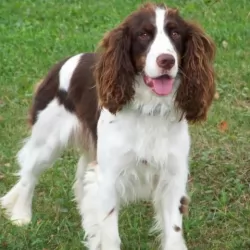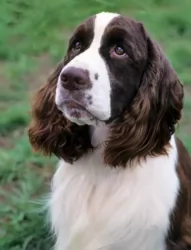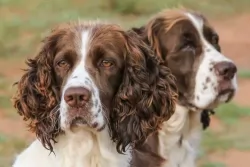 MyDogBreeds
MyDogBreedsSwiss Shorthaired Pinscher is originated from Switzerland but English Springer Spaniel is originated from United Kingdom. Both Swiss Shorthaired Pinscher and English Springer Spaniel are having almost same height. Swiss Shorthaired Pinscher may weigh 10 kg / 22 pounds lesser than English Springer Spaniel. Both Swiss Shorthaired Pinscher and English Springer Spaniel has same life span. Both Swiss Shorthaired Pinscher and English Springer Spaniel has almost same litter size. Both Swiss Shorthaired Pinscher and English Springer Spaniel requires Low maintenance.
The Swiss Shorthaired Pinscher is an ancient dog breed and dates back to 1780. It is believed that this dog breed is extinct, but that the German Pinscher of today is family of this dog breed. The dog used to be good on the farm as an all-purpose working dog.
When you look at the history of dogs, there are so many that have come and gone, never to be seen or heard of again. Other animals become extinct because of environmental factors, but with dogs it’s a bit different and most, like the Swiss Shorthaired Pinscher, died out simply because it became unfashionable.
Maybe the jobs that this dog was designed to do no longer existed and he died out because he was no longer needed.
 The English Springer Spaniel is one of many gun dog breeds that flush and retrieve. They descended from the Shropshire Spaniels and Norfolk Spaniels. The English Springer Spaniel is somewhat similar to the Welsh Springer Spaniel and believe it or not they are also closely related to the English Cocker Spaniel. In the last century the cockers and springers came from the same parents. The larger dogs flushed game and made game “spring” from the brush while the smaller dogs – the “cockers” would hunt woodcock. Eventually through specific breeding, the UKC of England recognized the “springers” as a separate breed.
The English Springer Spaniel is one of many gun dog breeds that flush and retrieve. They descended from the Shropshire Spaniels and Norfolk Spaniels. The English Springer Spaniel is somewhat similar to the Welsh Springer Spaniel and believe it or not they are also closely related to the English Cocker Spaniel. In the last century the cockers and springers came from the same parents. The larger dogs flushed game and made game “spring” from the brush while the smaller dogs – the “cockers” would hunt woodcock. Eventually through specific breeding, the UKC of England recognized the “springers” as a separate breed.
Sydenham Edwards, in 1801, proposed that the spaniels be divided into the Springing or Hawking Spaniel and the Cocking or Cocker Spaniel. From this point on there was a flourish in the development of spaniel breeds in the 19th century. They were usually named for the county in which they were founded or after the individual who developed them. In 1902, the English Springer Spaniel was officially recognized as its own breed by the UKC. It was not until 1910 that the AKC recognized them as well.
Described as a medium sized dog, the Swiss Shorthaired Pinscher is an extinct variety of the German Pinscher. Like that dog, the Swiss Shorthaired had a muscular, strong square build.
Possibly he also had his ears and tail docked at that time. It is thought that he stood between 40 – 48cm in height and weighed in the region of 11 to 15kg.
He had the typical looks of the Doberman Pinscher with short smooth hair in black and tan, short erect ears and a tail that was traditionally cropped. He was lean and muscular with brown eyes. They were working dogs in their day and were not considered the best dogs to have for the first time dog owner.
These dogs have always been hardworking, brave and fearless. They make good family pets too and get on well with children. They would have been adaptable too to life in the city or the countryside, so long as he got his exercise.
A well bred Swiss Shorthaired Pinscher was alert and a good guard dog, and one wonders why this dog with its good qualities died out.
 Among spaniels the English Springer is medium size and well compacted. Both the working dog and the show dog sport moderately long coats and a friendly tail. They both wear a gentle expression in their eyes. But there the commonality stops as the difference between the working English Springer Spaniel and the show line is greater in this breed than in any other. The gene pools have become almost separate over the last 70 years. If you put a field dog in the show ring they would not be able to compete. If you put a show line English Springer in the field, they would not have the stamina or speed for field trials.
Among spaniels the English Springer is medium size and well compacted. Both the working dog and the show dog sport moderately long coats and a friendly tail. They both wear a gentle expression in their eyes. But there the commonality stops as the difference between the working English Springer Spaniel and the show line is greater in this breed than in any other. The gene pools have become almost separate over the last 70 years. If you put a field dog in the show ring they would not be able to compete. If you put a show line English Springer in the field, they would not have the stamina or speed for field trials.
The field line has a coarser coat and less pendulous ears. They may dock a few inches off the tail, and they are much scruffier than the show dogs. On the other hand, the show dogs have dewlaps, pendant ears and dangling flews. They are heavier and thicker than the field dog. They have long muzzles, not so prominent eyes and docked tails. The English Springer Spaniel stands tall and proud, coming from an ancient line of Spaniels
The Swiss Shorthaired Pinscher is no longer around but he would no doubt have made a good family pet. He would have wanted to protect his human family.
He was a stubborn, bold dog, and maybe socialization and training didn’t exist then, but he would have benefited from it.
He’s the kind of dog that would have adapted well to life in the city or the countryside, but you could never neglect his exercise needs. In the right environment, this Pinscher would have made a loving, loyal pet.
 The English Springer Spaniel is a friendly dog who loves to please his people. They are great family dogs, easy-going and affectionate. In addition, they are attentive and alert which makes them such great hunting dogs. With exceptional speed and stamina, he needs activity to stimulate his body and brain. He is very intelligent. That intelligence can lead to stubbornness as well. He’d great with kids and good with other pets with perhaps the exception of cats. The breed is in love with water and will get in at any time.
The English Springer Spaniel is a friendly dog who loves to please his people. They are great family dogs, easy-going and affectionate. In addition, they are attentive and alert which makes them such great hunting dogs. With exceptional speed and stamina, he needs activity to stimulate his body and brain. He is very intelligent. That intelligence can lead to stubbornness as well. He’d great with kids and good with other pets with perhaps the exception of cats. The breed is in love with water and will get in at any time.
It is not too sure about the health status of this extinct dog but we can assume that he would have been prone to some of the typical dog illnesses there are.
Hypothyroidismd, bloat, cancer, cataracts, infections and obesity were just some of the diseases this dog would have had to contend with.
The thyroid glands in the neck produce hormones. These hormones affect the functioning of the body. Hypothyroidism in dogs is usually caused by shrinkage of the thyroid gland or inflammation.The disease occurs more often in Pinscher dogs.
You may notice a dulling or thinning of your dog’s hair, weight gain and reduced activity. Hypothyroid dogs also tend to battle more with ear- and skin infections. Veterinary treatment will become necessary.
It causes a whiteness,cloudiness or opacity on the lens of the eye. It's not painful for a dog but it can cause loss of vision. Surgery can improve vision for the dog.
 Not an uncommon issue for most medium to smaller sized dogs. It can lead to lameness or arthritis.
Not an uncommon issue for most medium to smaller sized dogs. It can lead to lameness or arthritis.
Loss of vision due to a deterioration of the retina.
Clubs form in the retinal tissue and can lead to blindness.
The twisting or distention of the stomach that effects dogs with deep chests and can lead to death if not treated immediately.
In those days of the Swiss Shorthaired Pinscher, maybe commercially manufactured dog foods weren’t available. If the dog were still around today, you would feed him dry kibble for medium sized dogs.
Probably the owners of these dogs fed them from the food they ate. It can be a good idea to feed any dog you have with some homemade food.
This can include things such as boiled chicken, brown rice or pasta and spinach, sweet potatoes and carrots. This is the kind of simple food that dogs love.
Being a farm dog in his day, he was probably tossed raw meat occasionally and this would have done him the world of good.
Although the short, smooth hair of the Swiss Shorthaired Pinscher is looked upon as low maintenance, the dog would have needed a good brush twice a week just to keep it shiny and healthy.
After a hard day of work on the farm, the Swiss Shorthaired Pinscher would have required a nice warm, dry spot to sleep.
 The English Springer Spaniel can gain weight easily and obesity is one of the biggest health issues for this breed. Feed them a high quality dry dog food. Working dogs need more energy and more calories than the inactive dog. An active member of the breed should have around 1353 calories every day in at least 2 meals if not 3. Do not feed a large meal before or after strenuous exercise as this can cause bloat.
The English Springer Spaniel can gain weight easily and obesity is one of the biggest health issues for this breed. Feed them a high quality dry dog food. Working dogs need more energy and more calories than the inactive dog. An active member of the breed should have around 1353 calories every day in at least 2 meals if not 3. Do not feed a large meal before or after strenuous exercise as this can cause bloat.
In addition to the health issues listed above the English Springer Spaniel is also prone to:
This is a genetic condition where the body cannot use the carbohydrates it takes in and convert it to energy. This is identified as a blood disorder.
Causes seizures but can be treated with medications.
With longer , droopy ears, infection is always a possibility. Clean them regularly and keep them dry.
The working English Springer Spaniel is a very energetic dog requiring daily exercise and loving to play. They love walks and hikes. They can excel in competitions such as rally, agility, tracking, field and obedience.